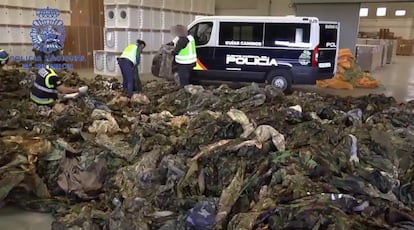Who is providing the army uniforms for Islamic State?
The seizure of 20,000 military fatigues at the port of Valencia reveals a network of support

The self-proclaimed Islamic State (ISIS) is not just a terrorist group but is in fact a proto-state, the acting Spanish Foreign Minister José Manuel García-Margallo has said.
And as such, besides recruiting foreign fighters, ISIS needs to arm them, equip them, and supply them with uniforms and boots to give them the appearance of a true army.
Where do the four-by-four vehicles often seen in their propaganda videos come from? Who supplies them with the rifles and machine guns that they use? Where do they get their uniforms? Who orders them and how are they paid for?
The network did not just send uniforms to Islamic State, but could also manage any other kind of request
On March 15, Spanish police officers seized the contents of a container at the Spanish port of Algeciras (Cádiz) and two more in Valencia. The first contained second-hand clothing, as the customs declaration stated.
But inside the other two, authorities found a baler machine for packing used clothes and, hidden under piles of second-hand clothing, five tons of perfectly wrapped and labeled packages containing 20,000 brand-new military uniforms – enough to supply an entire army.
The container had come from Saudi Arabia, although the uniforms looked like they had come from a NATO country. The destination was Turkey – first to the port of Mersin near Cyprus, and then, via road, to Bad al Hawa, on the other side of the Syrian border.
An ongoing operation
The seizure, ordered by Spanish High Court Judge Eloy Velasco, was the continuation of an operation launched on February 7, when authorities arrested seven suspected members of a support group for ISIS in Ontinyent (Valencia), Ceuta and the Alicante municipalities of Crevillent, L’Alqueria d’Asnar, Muro d’Alcoi and Alicante.
Sign up for our newsletter
EL PAÍS English Edition is launching a weekly newsletter. Sign up today to receive a selection of our best stories in your inbox every Saturday morning. For full details about how to subscribe, click here.
The alleged head of the network was Ammar Termanini, born in Aleppo (Syria) in 1972, and who arrived in Spain in 2012 after having lived in The Netherlands, Belgium and United Kingdom.
Once in Spain he set up a company, Tigre Negro S.L. (Black Tiger Ltd.), of which he was the sole administrator. The company was dedicated to the import and export of textile goods. Under cover of providing humanitarian aid, he sent a number of packages to Syria, where he traveled frequently.
Termanini did not hide which side he was on. He had posted photos of himself holding automatic weapons on his Facebook page, while phone taps revealed that, like many jihadists, he had switched his allegiance from Al Qaeda to the self-proclaimed Caliphate. During the police operation, he was found in possession of a 22-calibre Long Rifle pistol, which was obviously illegal.
The financier behind Termanini was supposedly Mohamed Abu El Rub Karima, born in Jordan in 1960 and a resident of Ontinyent. Inside his warehouse in the L’Altet industrial park, police found uniforms similar to those later discovered in the Valencia container. Karima raised funds and made payments through hawala, the traditional Muslim system based on trust, and which allows for money to be moved around different countries without leaving any trace of bank transfers.
The network did not just send uniforms to Islamic State, but could also manage any other kind of request. One example is a type of fertilizer that is not sold in Spain and can be used to make explosives.
The discoveries illustrate how the web of support for Islamic State is very complicated and has ramifications in a number of countries. Investigators are only just starting to unpick it, but are already sure that, as was the case with Basque terrorist group ETA in its day, arresting its fighters is not enough: they need to cut off its financing and its logistics supply route.
English version by Simon Hunter.
Tu suscripción se está usando en otro dispositivo
¿Quieres añadir otro usuario a tu suscripción?
Si continúas leyendo en este dispositivo, no se podrá leer en el otro.
FlechaTu suscripción se está usando en otro dispositivo y solo puedes acceder a EL PAÍS desde un dispositivo a la vez.
Si quieres compartir tu cuenta, cambia tu suscripción a la modalidad Premium, así podrás añadir otro usuario. Cada uno accederá con su propia cuenta de email, lo que os permitirá personalizar vuestra experiencia en EL PAÍS.
¿Tienes una suscripción de empresa? Accede aquí para contratar más cuentas.
En el caso de no saber quién está usando tu cuenta, te recomendamos cambiar tu contraseña aquí.
Si decides continuar compartiendo tu cuenta, este mensaje se mostrará en tu dispositivo y en el de la otra persona que está usando tu cuenta de forma indefinida, afectando a tu experiencia de lectura. Puedes consultar aquí los términos y condiciones de la suscripción digital.








































